Professional Development and Personal Growth
VerifiedAdded on 2020/10/22
|17
|4530
|286
AI Summary
This assignment focuses on the importance of professional development and personal growth in various fields. It includes a comprehensive list of research papers and studies that explore different aspects of professional development, such as employee development, personal strategic planning, leadership, and lifelong learning. The provided documents cover a range of topics, from self-directed learning to knowledge sharing and organizational effectiveness. This compilation is ideal for students, professionals, and anyone seeking to improve their skills and career prospects.
Contribute Materials
Your contribution can guide someone’s learning journey. Share your
documents today.
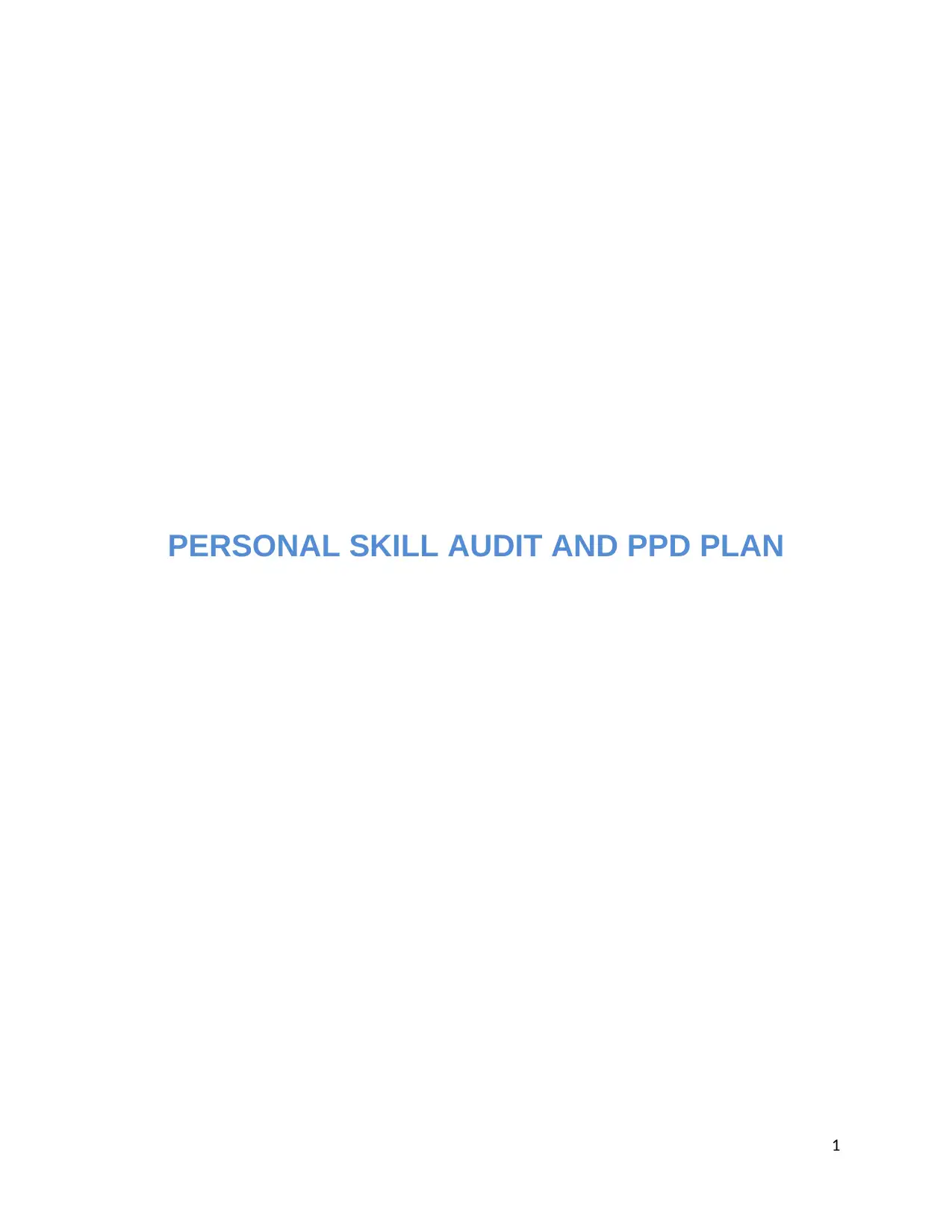
PERSONAL SKILL AUDIT AND PPD PLAN
1
1
Secure Best Marks with AI Grader
Need help grading? Try our AI Grader for instant feedback on your assignments.
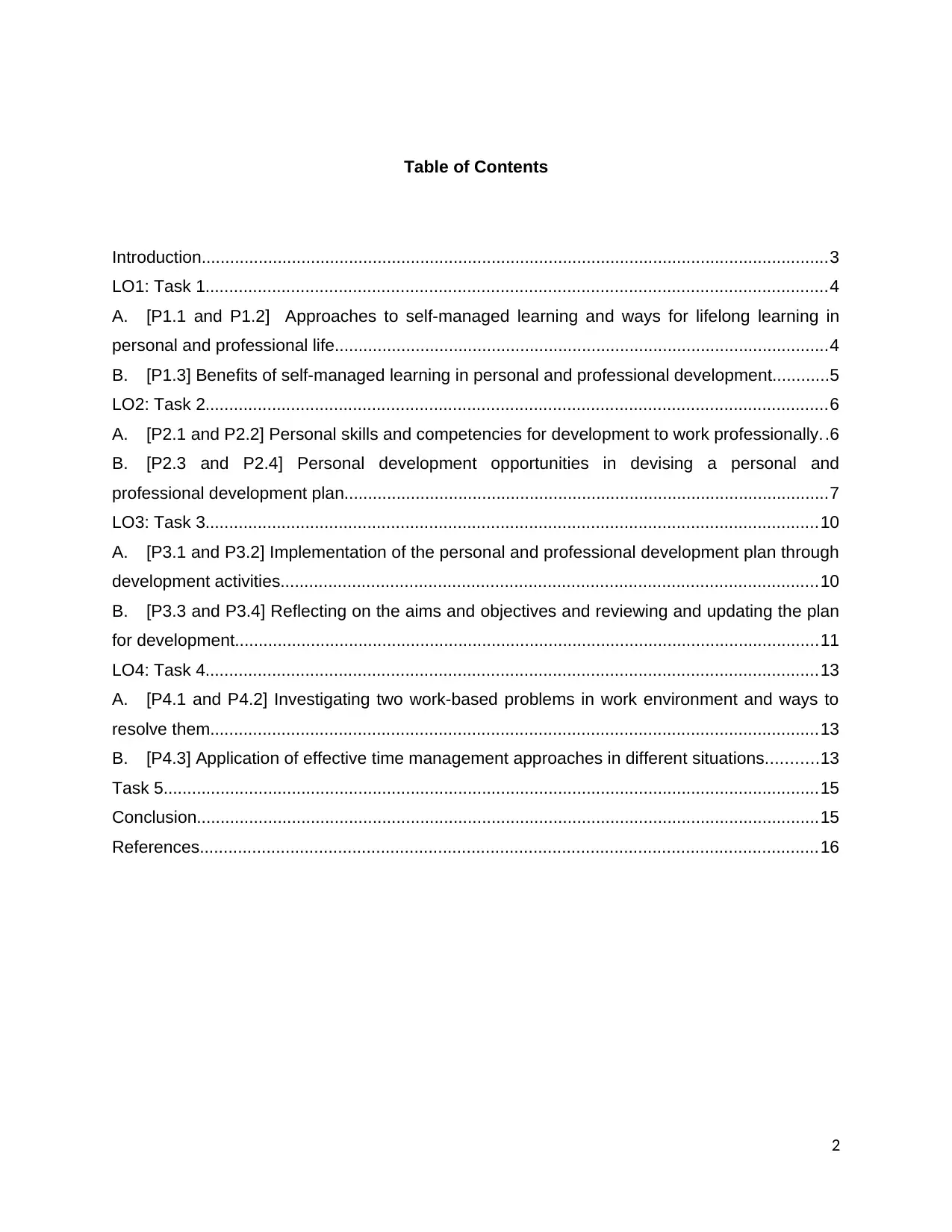
Table of Contents
Introduction....................................................................................................................................3
LO1: Task 1...................................................................................................................................4
A. [P1.1 and P1.2] Approaches to self-managed learning and ways for lifelong learning in
personal and professional life........................................................................................................4
B. [P1.3] Benefits of self-managed learning in personal and professional development............5
LO2: Task 2...................................................................................................................................6
A. [P2.1 and P2.2] Personal skills and competencies for development to work professionally..6
B. [P2.3 and P2.4] Personal development opportunities in devising a personal and
professional development plan......................................................................................................7
LO3: Task 3.................................................................................................................................10
A. [P3.1 and P3.2] Implementation of the personal and professional development plan through
development activities.................................................................................................................10
B. [P3.3 and P3.4] Reflecting on the aims and objectives and reviewing and updating the plan
for development...........................................................................................................................11
LO4: Task 4.................................................................................................................................13
A. [P4.1 and P4.2] Investigating two work-based problems in work environment and ways to
resolve them................................................................................................................................13
B. [P4.3] Application of effective time management approaches in different situations...........13
Task 5..........................................................................................................................................15
Conclusion...................................................................................................................................15
References..................................................................................................................................16
2
Introduction....................................................................................................................................3
LO1: Task 1...................................................................................................................................4
A. [P1.1 and P1.2] Approaches to self-managed learning and ways for lifelong learning in
personal and professional life........................................................................................................4
B. [P1.3] Benefits of self-managed learning in personal and professional development............5
LO2: Task 2...................................................................................................................................6
A. [P2.1 and P2.2] Personal skills and competencies for development to work professionally..6
B. [P2.3 and P2.4] Personal development opportunities in devising a personal and
professional development plan......................................................................................................7
LO3: Task 3.................................................................................................................................10
A. [P3.1 and P3.2] Implementation of the personal and professional development plan through
development activities.................................................................................................................10
B. [P3.3 and P3.4] Reflecting on the aims and objectives and reviewing and updating the plan
for development...........................................................................................................................11
LO4: Task 4.................................................................................................................................13
A. [P4.1 and P4.2] Investigating two work-based problems in work environment and ways to
resolve them................................................................................................................................13
B. [P4.3] Application of effective time management approaches in different situations...........13
Task 5..........................................................................................................................................15
Conclusion...................................................................................................................................15
References..................................................................................................................................16
2
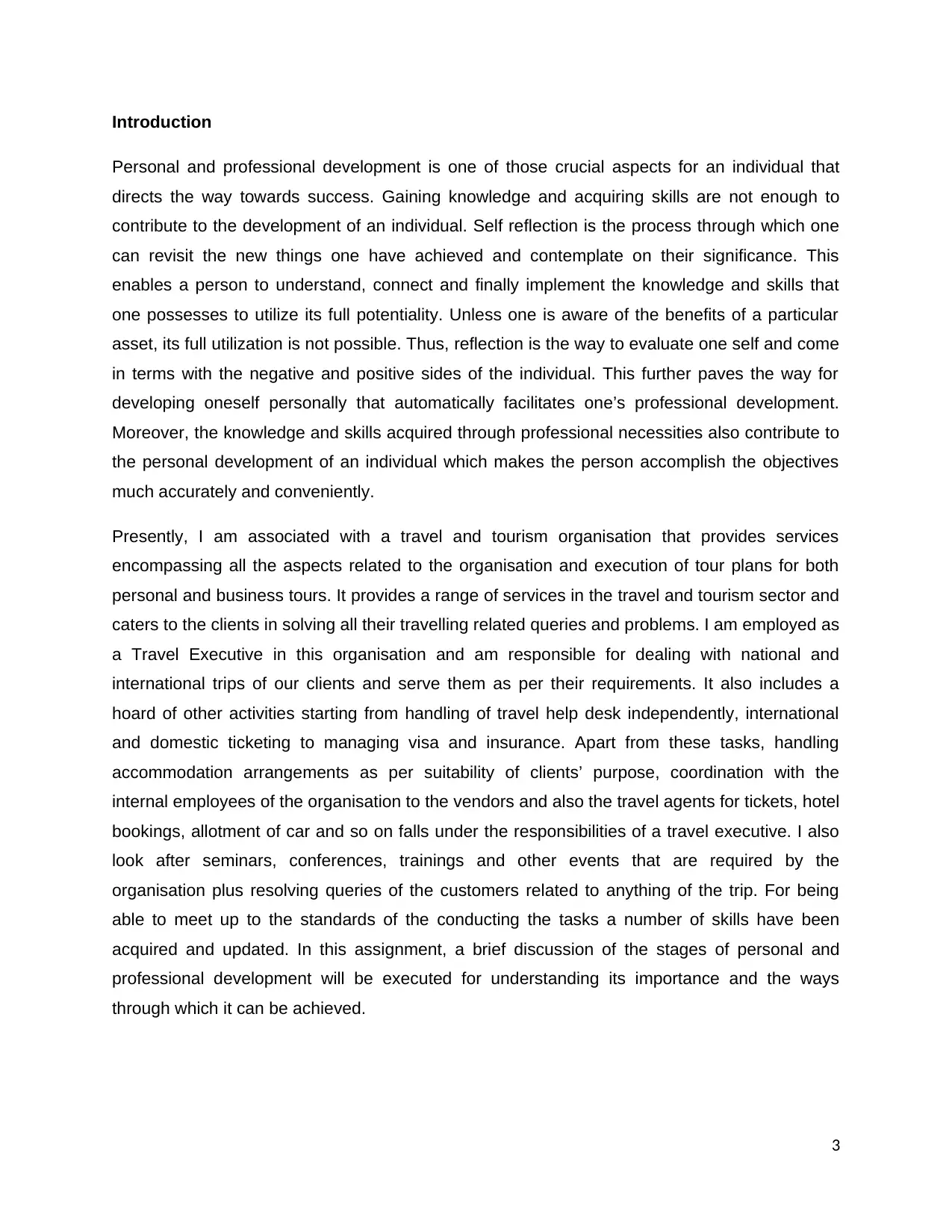
Introduction
Personal and professional development is one of those crucial aspects for an individual that
directs the way towards success. Gaining knowledge and acquiring skills are not enough to
contribute to the development of an individual. Self reflection is the process through which one
can revisit the new things one have achieved and contemplate on their significance. This
enables a person to understand, connect and finally implement the knowledge and skills that
one possesses to utilize its full potentiality. Unless one is aware of the benefits of a particular
asset, its full utilization is not possible. Thus, reflection is the way to evaluate one self and come
in terms with the negative and positive sides of the individual. This further paves the way for
developing oneself personally that automatically facilitates one’s professional development.
Moreover, the knowledge and skills acquired through professional necessities also contribute to
the personal development of an individual which makes the person accomplish the objectives
much accurately and conveniently.
Presently, I am associated with a travel and tourism organisation that provides services
encompassing all the aspects related to the organisation and execution of tour plans for both
personal and business tours. It provides a range of services in the travel and tourism sector and
caters to the clients in solving all their travelling related queries and problems. I am employed as
a Travel Executive in this organisation and am responsible for dealing with national and
international trips of our clients and serve them as per their requirements. It also includes a
hoard of other activities starting from handling of travel help desk independently, international
and domestic ticketing to managing visa and insurance. Apart from these tasks, handling
accommodation arrangements as per suitability of clients’ purpose, coordination with the
internal employees of the organisation to the vendors and also the travel agents for tickets, hotel
bookings, allotment of car and so on falls under the responsibilities of a travel executive. I also
look after seminars, conferences, trainings and other events that are required by the
organisation plus resolving queries of the customers related to anything of the trip. For being
able to meet up to the standards of the conducting the tasks a number of skills have been
acquired and updated. In this assignment, a brief discussion of the stages of personal and
professional development will be executed for understanding its importance and the ways
through which it can be achieved.
3
Personal and professional development is one of those crucial aspects for an individual that
directs the way towards success. Gaining knowledge and acquiring skills are not enough to
contribute to the development of an individual. Self reflection is the process through which one
can revisit the new things one have achieved and contemplate on their significance. This
enables a person to understand, connect and finally implement the knowledge and skills that
one possesses to utilize its full potentiality. Unless one is aware of the benefits of a particular
asset, its full utilization is not possible. Thus, reflection is the way to evaluate one self and come
in terms with the negative and positive sides of the individual. This further paves the way for
developing oneself personally that automatically facilitates one’s professional development.
Moreover, the knowledge and skills acquired through professional necessities also contribute to
the personal development of an individual which makes the person accomplish the objectives
much accurately and conveniently.
Presently, I am associated with a travel and tourism organisation that provides services
encompassing all the aspects related to the organisation and execution of tour plans for both
personal and business tours. It provides a range of services in the travel and tourism sector and
caters to the clients in solving all their travelling related queries and problems. I am employed as
a Travel Executive in this organisation and am responsible for dealing with national and
international trips of our clients and serve them as per their requirements. It also includes a
hoard of other activities starting from handling of travel help desk independently, international
and domestic ticketing to managing visa and insurance. Apart from these tasks, handling
accommodation arrangements as per suitability of clients’ purpose, coordination with the
internal employees of the organisation to the vendors and also the travel agents for tickets, hotel
bookings, allotment of car and so on falls under the responsibilities of a travel executive. I also
look after seminars, conferences, trainings and other events that are required by the
organisation plus resolving queries of the customers related to anything of the trip. For being
able to meet up to the standards of the conducting the tasks a number of skills have been
acquired and updated. In this assignment, a brief discussion of the stages of personal and
professional development will be executed for understanding its importance and the ways
through which it can be achieved.
3
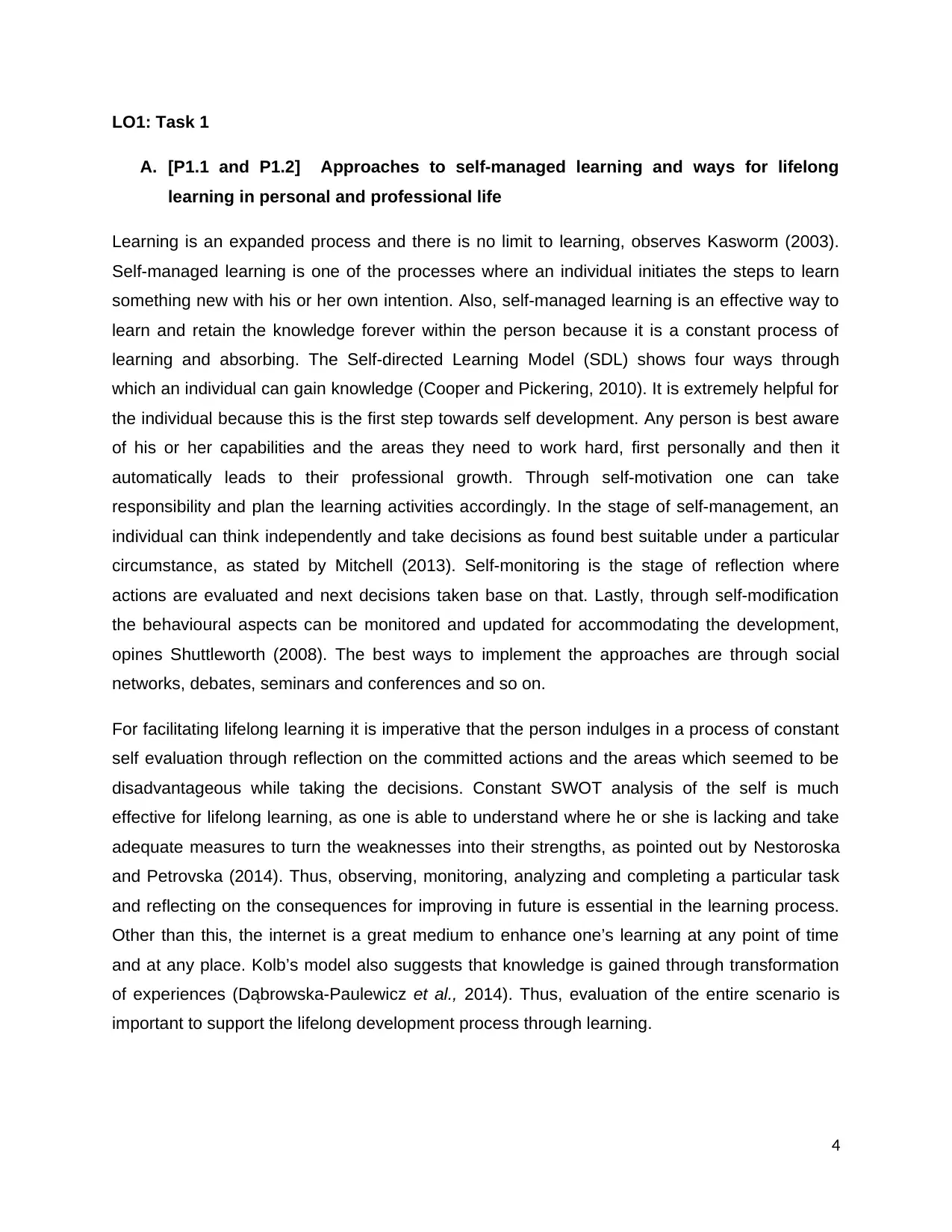
LO1: Task 1
A. [P1.1 and P1.2] Approaches to self-managed learning and ways for lifelong
learning in personal and professional life
Learning is an expanded process and there is no limit to learning, observes Kasworm (2003).
Self-managed learning is one of the processes where an individual initiates the steps to learn
something new with his or her own intention. Also, self-managed learning is an effective way to
learn and retain the knowledge forever within the person because it is a constant process of
learning and absorbing. The Self-directed Learning Model (SDL) shows four ways through
which an individual can gain knowledge (Cooper and Pickering, 2010). It is extremely helpful for
the individual because this is the first step towards self development. Any person is best aware
of his or her capabilities and the areas they need to work hard, first personally and then it
automatically leads to their professional growth. Through self-motivation one can take
responsibility and plan the learning activities accordingly. In the stage of self-management, an
individual can think independently and take decisions as found best suitable under a particular
circumstance, as stated by Mitchell (2013). Self-monitoring is the stage of reflection where
actions are evaluated and next decisions taken base on that. Lastly, through self-modification
the behavioural aspects can be monitored and updated for accommodating the development,
opines Shuttleworth (2008). The best ways to implement the approaches are through social
networks, debates, seminars and conferences and so on.
For facilitating lifelong learning it is imperative that the person indulges in a process of constant
self evaluation through reflection on the committed actions and the areas which seemed to be
disadvantageous while taking the decisions. Constant SWOT analysis of the self is much
effective for lifelong learning, as one is able to understand where he or she is lacking and take
adequate measures to turn the weaknesses into their strengths, as pointed out by Nestoroska
and Petrovska (2014). Thus, observing, monitoring, analyzing and completing a particular task
and reflecting on the consequences for improving in future is essential in the learning process.
Other than this, the internet is a great medium to enhance one’s learning at any point of time
and at any place. Kolb’s model also suggests that knowledge is gained through transformation
of experiences (Dąbrowska-Paulewicz et al., 2014). Thus, evaluation of the entire scenario is
important to support the lifelong development process through learning.
4
A. [P1.1 and P1.2] Approaches to self-managed learning and ways for lifelong
learning in personal and professional life
Learning is an expanded process and there is no limit to learning, observes Kasworm (2003).
Self-managed learning is one of the processes where an individual initiates the steps to learn
something new with his or her own intention. Also, self-managed learning is an effective way to
learn and retain the knowledge forever within the person because it is a constant process of
learning and absorbing. The Self-directed Learning Model (SDL) shows four ways through
which an individual can gain knowledge (Cooper and Pickering, 2010). It is extremely helpful for
the individual because this is the first step towards self development. Any person is best aware
of his or her capabilities and the areas they need to work hard, first personally and then it
automatically leads to their professional growth. Through self-motivation one can take
responsibility and plan the learning activities accordingly. In the stage of self-management, an
individual can think independently and take decisions as found best suitable under a particular
circumstance, as stated by Mitchell (2013). Self-monitoring is the stage of reflection where
actions are evaluated and next decisions taken base on that. Lastly, through self-modification
the behavioural aspects can be monitored and updated for accommodating the development,
opines Shuttleworth (2008). The best ways to implement the approaches are through social
networks, debates, seminars and conferences and so on.
For facilitating lifelong learning it is imperative that the person indulges in a process of constant
self evaluation through reflection on the committed actions and the areas which seemed to be
disadvantageous while taking the decisions. Constant SWOT analysis of the self is much
effective for lifelong learning, as one is able to understand where he or she is lacking and take
adequate measures to turn the weaknesses into their strengths, as pointed out by Nestoroska
and Petrovska (2014). Thus, observing, monitoring, analyzing and completing a particular task
and reflecting on the consequences for improving in future is essential in the learning process.
Other than this, the internet is a great medium to enhance one’s learning at any point of time
and at any place. Kolb’s model also suggests that knowledge is gained through transformation
of experiences (Dąbrowska-Paulewicz et al., 2014). Thus, evaluation of the entire scenario is
important to support the lifelong development process through learning.
4
Secure Best Marks with AI Grader
Need help grading? Try our AI Grader for instant feedback on your assignments.
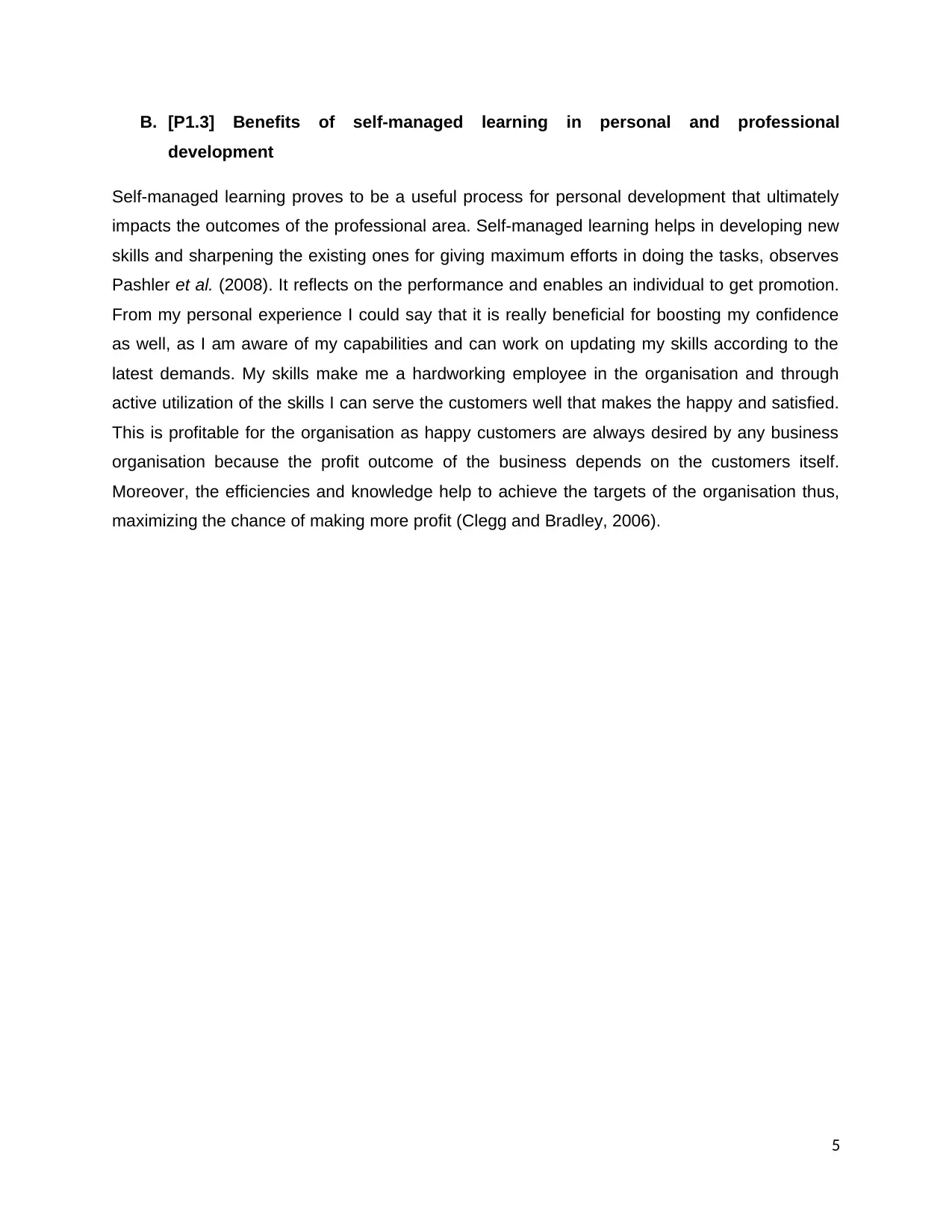
B. [P1.3] Benefits of self-managed learning in personal and professional
development
Self-managed learning proves to be a useful process for personal development that ultimately
impacts the outcomes of the professional area. Self-managed learning helps in developing new
skills and sharpening the existing ones for giving maximum efforts in doing the tasks, observes
Pashler et al. (2008). It reflects on the performance and enables an individual to get promotion.
From my personal experience I could say that it is really beneficial for boosting my confidence
as well, as I am aware of my capabilities and can work on updating my skills according to the
latest demands. My skills make me a hardworking employee in the organisation and through
active utilization of the skills I can serve the customers well that makes the happy and satisfied.
This is profitable for the organisation as happy customers are always desired by any business
organisation because the profit outcome of the business depends on the customers itself.
Moreover, the efficiencies and knowledge help to achieve the targets of the organisation thus,
maximizing the chance of making more profit (Clegg and Bradley, 2006).
5
development
Self-managed learning proves to be a useful process for personal development that ultimately
impacts the outcomes of the professional area. Self-managed learning helps in developing new
skills and sharpening the existing ones for giving maximum efforts in doing the tasks, observes
Pashler et al. (2008). It reflects on the performance and enables an individual to get promotion.
From my personal experience I could say that it is really beneficial for boosting my confidence
as well, as I am aware of my capabilities and can work on updating my skills according to the
latest demands. My skills make me a hardworking employee in the organisation and through
active utilization of the skills I can serve the customers well that makes the happy and satisfied.
This is profitable for the organisation as happy customers are always desired by any business
organisation because the profit outcome of the business depends on the customers itself.
Moreover, the efficiencies and knowledge help to achieve the targets of the organisation thus,
maximizing the chance of making more profit (Clegg and Bradley, 2006).
5
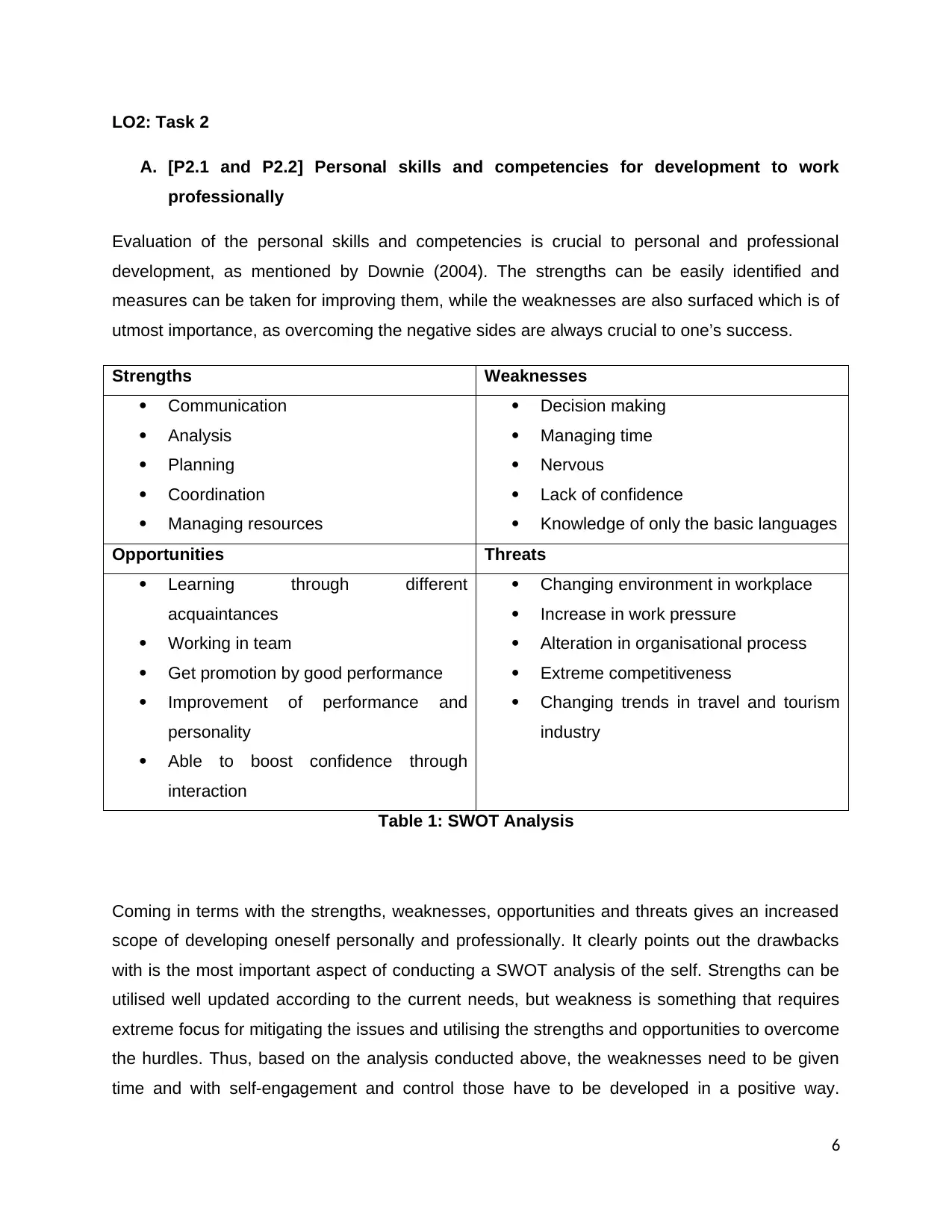
LO2: Task 2
A. [P2.1 and P2.2] Personal skills and competencies for development to work
professionally
Evaluation of the personal skills and competencies is crucial to personal and professional
development, as mentioned by Downie (2004). The strengths can be easily identified and
measures can be taken for improving them, while the weaknesses are also surfaced which is of
utmost importance, as overcoming the negative sides are always crucial to one’s success.
Strengths Weaknesses
Communication
Analysis
Planning
Coordination
Managing resources
Decision making
Managing time
Nervous
Lack of confidence
Knowledge of only the basic languages
Opportunities Threats
Learning through different
acquaintances
Working in team
Get promotion by good performance
Improvement of performance and
personality
Able to boost confidence through
interaction
Changing environment in workplace
Increase in work pressure
Alteration in organisational process
Extreme competitiveness
Changing trends in travel and tourism
industry
Table 1: SWOT Analysis
Coming in terms with the strengths, weaknesses, opportunities and threats gives an increased
scope of developing oneself personally and professionally. It clearly points out the drawbacks
with is the most important aspect of conducting a SWOT analysis of the self. Strengths can be
utilised well updated according to the current needs, but weakness is something that requires
extreme focus for mitigating the issues and utilising the strengths and opportunities to overcome
the hurdles. Thus, based on the analysis conducted above, the weaknesses need to be given
time and with self-engagement and control those have to be developed in a positive way.
6
A. [P2.1 and P2.2] Personal skills and competencies for development to work
professionally
Evaluation of the personal skills and competencies is crucial to personal and professional
development, as mentioned by Downie (2004). The strengths can be easily identified and
measures can be taken for improving them, while the weaknesses are also surfaced which is of
utmost importance, as overcoming the negative sides are always crucial to one’s success.
Strengths Weaknesses
Communication
Analysis
Planning
Coordination
Managing resources
Decision making
Managing time
Nervous
Lack of confidence
Knowledge of only the basic languages
Opportunities Threats
Learning through different
acquaintances
Working in team
Get promotion by good performance
Improvement of performance and
personality
Able to boost confidence through
interaction
Changing environment in workplace
Increase in work pressure
Alteration in organisational process
Extreme competitiveness
Changing trends in travel and tourism
industry
Table 1: SWOT Analysis
Coming in terms with the strengths, weaknesses, opportunities and threats gives an increased
scope of developing oneself personally and professionally. It clearly points out the drawbacks
with is the most important aspect of conducting a SWOT analysis of the self. Strengths can be
utilised well updated according to the current needs, but weakness is something that requires
extreme focus for mitigating the issues and utilising the strengths and opportunities to overcome
the hurdles. Thus, based on the analysis conducted above, the weaknesses need to be given
time and with self-engagement and control those have to be developed in a positive way.
6
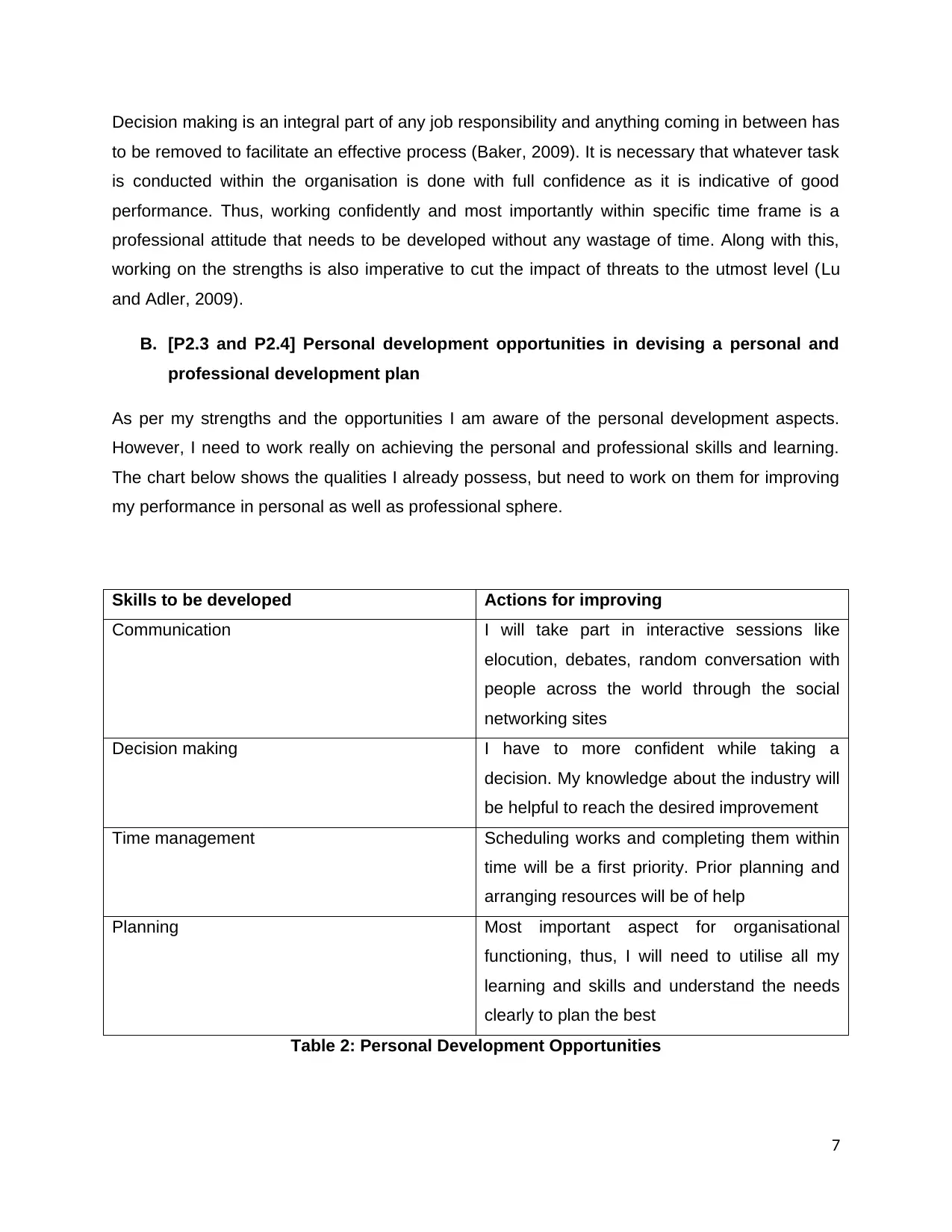
Decision making is an integral part of any job responsibility and anything coming in between has
to be removed to facilitate an effective process (Baker, 2009). It is necessary that whatever task
is conducted within the organisation is done with full confidence as it is indicative of good
performance. Thus, working confidently and most importantly within specific time frame is a
professional attitude that needs to be developed without any wastage of time. Along with this,
working on the strengths is also imperative to cut the impact of threats to the utmost level (Lu
and Adler, 2009).
B. [P2.3 and P2.4] Personal development opportunities in devising a personal and
professional development plan
As per my strengths and the opportunities I am aware of the personal development aspects.
However, I need to work really on achieving the personal and professional skills and learning.
The chart below shows the qualities I already possess, but need to work on them for improving
my performance in personal as well as professional sphere.
Skills to be developed Actions for improving
Communication I will take part in interactive sessions like
elocution, debates, random conversation with
people across the world through the social
networking sites
Decision making I have to more confident while taking a
decision. My knowledge about the industry will
be helpful to reach the desired improvement
Time management Scheduling works and completing them within
time will be a first priority. Prior planning and
arranging resources will be of help
Planning Most important aspect for organisational
functioning, thus, I will need to utilise all my
learning and skills and understand the needs
clearly to plan the best
Table 2: Personal Development Opportunities
7
to be removed to facilitate an effective process (Baker, 2009). It is necessary that whatever task
is conducted within the organisation is done with full confidence as it is indicative of good
performance. Thus, working confidently and most importantly within specific time frame is a
professional attitude that needs to be developed without any wastage of time. Along with this,
working on the strengths is also imperative to cut the impact of threats to the utmost level (Lu
and Adler, 2009).
B. [P2.3 and P2.4] Personal development opportunities in devising a personal and
professional development plan
As per my strengths and the opportunities I am aware of the personal development aspects.
However, I need to work really on achieving the personal and professional skills and learning.
The chart below shows the qualities I already possess, but need to work on them for improving
my performance in personal as well as professional sphere.
Skills to be developed Actions for improving
Communication I will take part in interactive sessions like
elocution, debates, random conversation with
people across the world through the social
networking sites
Decision making I have to more confident while taking a
decision. My knowledge about the industry will
be helpful to reach the desired improvement
Time management Scheduling works and completing them within
time will be a first priority. Prior planning and
arranging resources will be of help
Planning Most important aspect for organisational
functioning, thus, I will need to utilise all my
learning and skills and understand the needs
clearly to plan the best
Table 2: Personal Development Opportunities
7
Paraphrase This Document
Need a fresh take? Get an instant paraphrase of this document with our AI Paraphraser
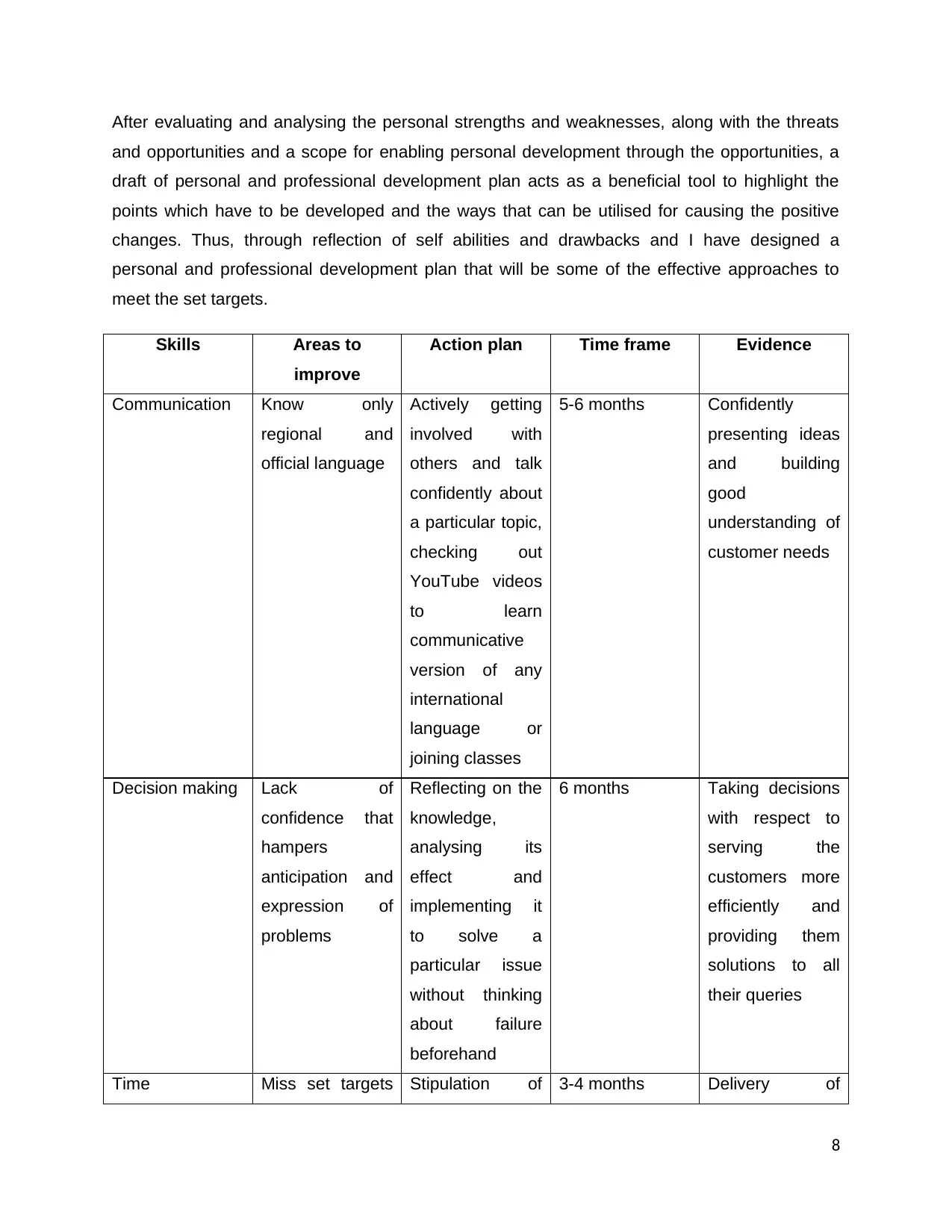
After evaluating and analysing the personal strengths and weaknesses, along with the threats
and opportunities and a scope for enabling personal development through the opportunities, a
draft of personal and professional development plan acts as a beneficial tool to highlight the
points which have to be developed and the ways that can be utilised for causing the positive
changes. Thus, through reflection of self abilities and drawbacks and I have designed a
personal and professional development plan that will be some of the effective approaches to
meet the set targets.
Skills Areas to
improve
Action plan Time frame Evidence
Communication Know only
regional and
official language
Actively getting
involved with
others and talk
confidently about
a particular topic,
checking out
YouTube videos
to learn
communicative
version of any
international
language or
joining classes
5-6 months Confidently
presenting ideas
and building
good
understanding of
customer needs
Decision making Lack of
confidence that
hampers
anticipation and
expression of
problems
Reflecting on the
knowledge,
analysing its
effect and
implementing it
to solve a
particular issue
without thinking
about failure
beforehand
6 months Taking decisions
with respect to
serving the
customers more
efficiently and
providing them
solutions to all
their queries
Time Miss set targets Stipulation of 3-4 months Delivery of
8
and opportunities and a scope for enabling personal development through the opportunities, a
draft of personal and professional development plan acts as a beneficial tool to highlight the
points which have to be developed and the ways that can be utilised for causing the positive
changes. Thus, through reflection of self abilities and drawbacks and I have designed a
personal and professional development plan that will be some of the effective approaches to
meet the set targets.
Skills Areas to
improve
Action plan Time frame Evidence
Communication Know only
regional and
official language
Actively getting
involved with
others and talk
confidently about
a particular topic,
checking out
YouTube videos
to learn
communicative
version of any
international
language or
joining classes
5-6 months Confidently
presenting ideas
and building
good
understanding of
customer needs
Decision making Lack of
confidence that
hampers
anticipation and
expression of
problems
Reflecting on the
knowledge,
analysing its
effect and
implementing it
to solve a
particular issue
without thinking
about failure
beforehand
6 months Taking decisions
with respect to
serving the
customers more
efficiently and
providing them
solutions to all
their queries
Time Miss set targets Stipulation of 3-4 months Delivery of
8
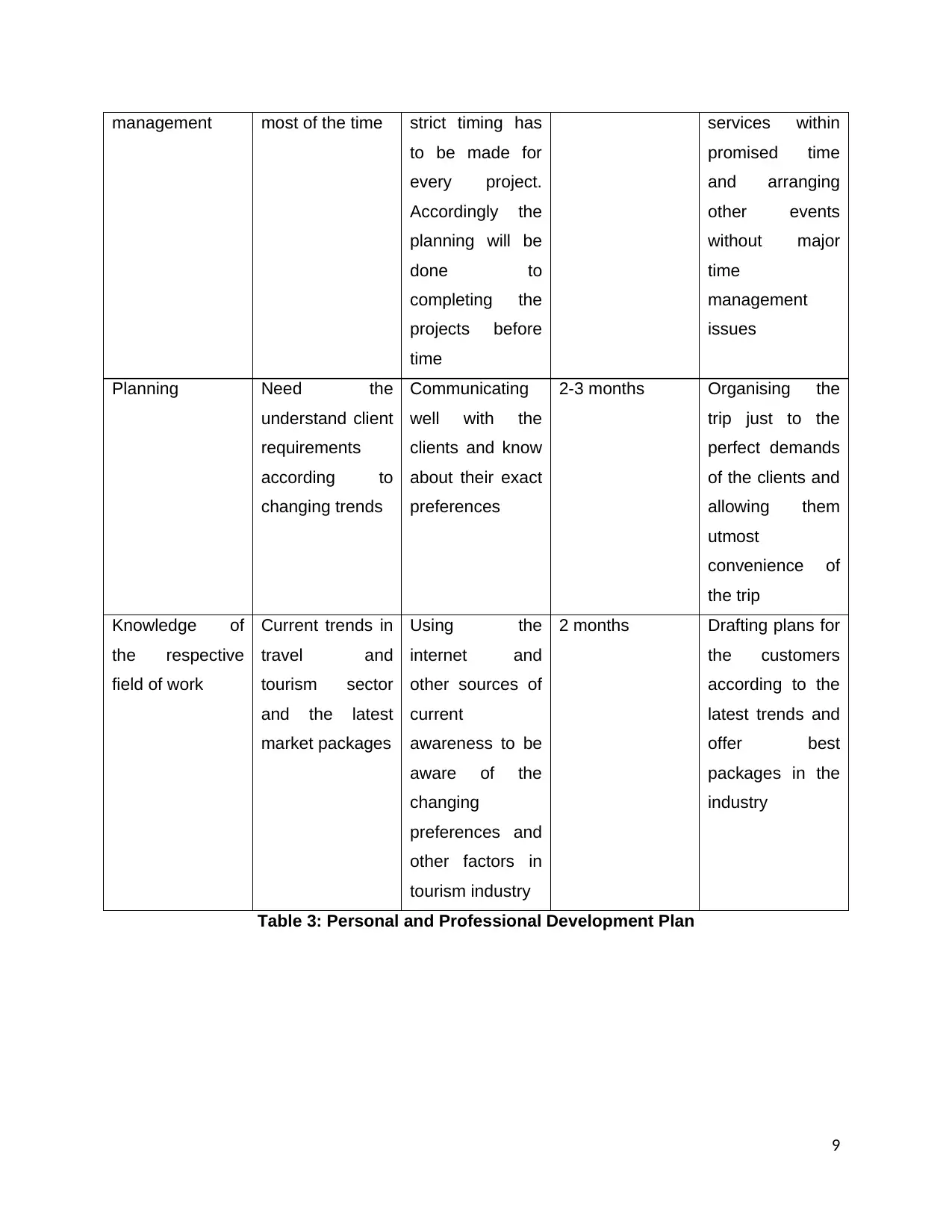
management most of the time strict timing has
to be made for
every project.
Accordingly the
planning will be
done to
completing the
projects before
time
services within
promised time
and arranging
other events
without major
time
management
issues
Planning Need the
understand client
requirements
according to
changing trends
Communicating
well with the
clients and know
about their exact
preferences
2-3 months Organising the
trip just to the
perfect demands
of the clients and
allowing them
utmost
convenience of
the trip
Knowledge of
the respective
field of work
Current trends in
travel and
tourism sector
and the latest
market packages
Using the
internet and
other sources of
current
awareness to be
aware of the
changing
preferences and
other factors in
tourism industry
2 months Drafting plans for
the customers
according to the
latest trends and
offer best
packages in the
industry
Table 3: Personal and Professional Development Plan
9
to be made for
every project.
Accordingly the
planning will be
done to
completing the
projects before
time
services within
promised time
and arranging
other events
without major
time
management
issues
Planning Need the
understand client
requirements
according to
changing trends
Communicating
well with the
clients and know
about their exact
preferences
2-3 months Organising the
trip just to the
perfect demands
of the clients and
allowing them
utmost
convenience of
the trip
Knowledge of
the respective
field of work
Current trends in
travel and
tourism sector
and the latest
market packages
Using the
internet and
other sources of
current
awareness to be
aware of the
changing
preferences and
other factors in
tourism industry
2 months Drafting plans for
the customers
according to the
latest trends and
offer best
packages in the
industry
Table 3: Personal and Professional Development Plan
9
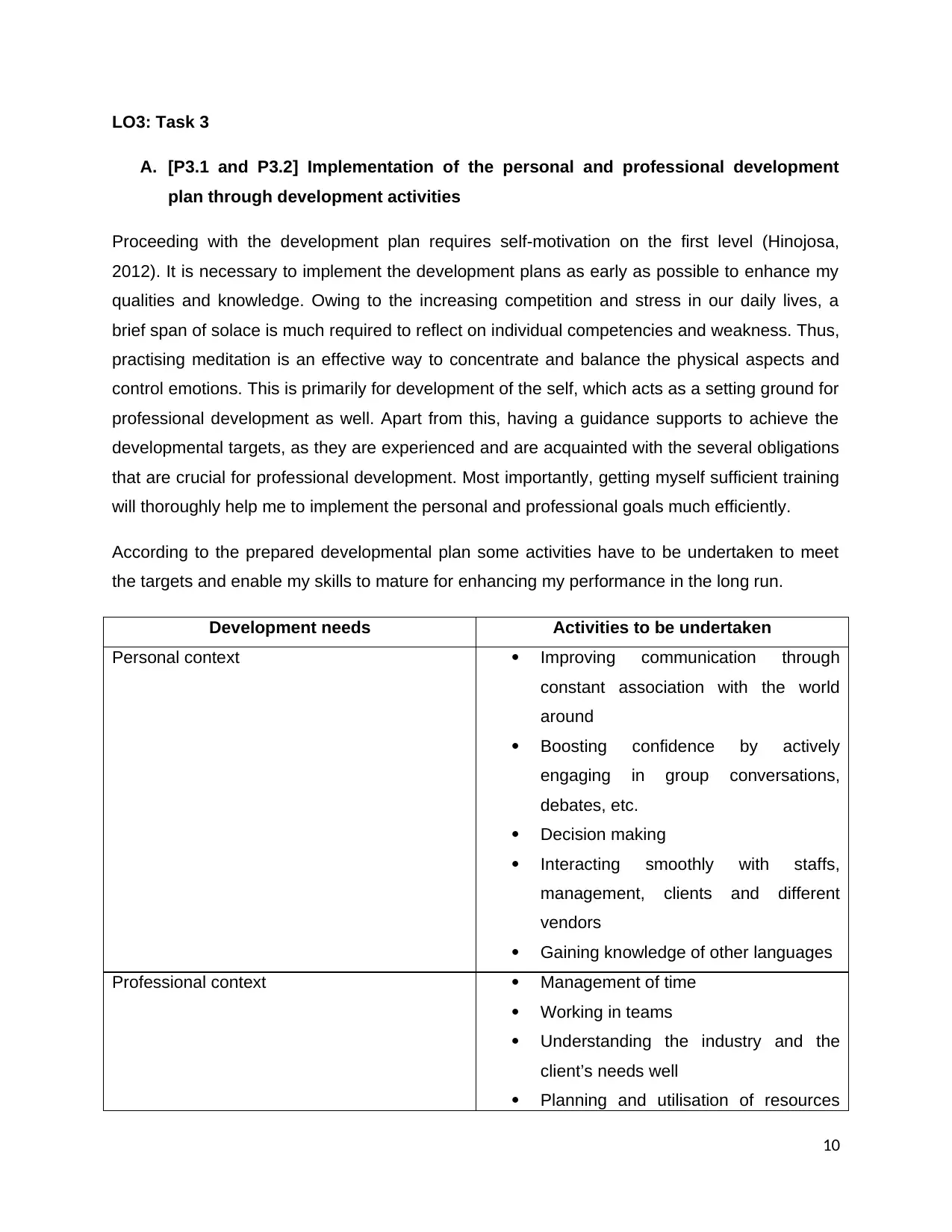
LO3: Task 3
A. [P3.1 and P3.2] Implementation of the personal and professional development
plan through development activities
Proceeding with the development plan requires self-motivation on the first level (Hinojosa,
2012). It is necessary to implement the development plans as early as possible to enhance my
qualities and knowledge. Owing to the increasing competition and stress in our daily lives, a
brief span of solace is much required to reflect on individual competencies and weakness. Thus,
practising meditation is an effective way to concentrate and balance the physical aspects and
control emotions. This is primarily for development of the self, which acts as a setting ground for
professional development as well. Apart from this, having a guidance supports to achieve the
developmental targets, as they are experienced and are acquainted with the several obligations
that are crucial for professional development. Most importantly, getting myself sufficient training
will thoroughly help me to implement the personal and professional goals much efficiently.
According to the prepared developmental plan some activities have to be undertaken to meet
the targets and enable my skills to mature for enhancing my performance in the long run.
Development needs Activities to be undertaken
Personal context Improving communication through
constant association with the world
around
Boosting confidence by actively
engaging in group conversations,
debates, etc.
Decision making
Interacting smoothly with staffs,
management, clients and different
vendors
Gaining knowledge of other languages
Professional context Management of time
Working in teams
Understanding the industry and the
client’s needs well
Planning and utilisation of resources
10
A. [P3.1 and P3.2] Implementation of the personal and professional development
plan through development activities
Proceeding with the development plan requires self-motivation on the first level (Hinojosa,
2012). It is necessary to implement the development plans as early as possible to enhance my
qualities and knowledge. Owing to the increasing competition and stress in our daily lives, a
brief span of solace is much required to reflect on individual competencies and weakness. Thus,
practising meditation is an effective way to concentrate and balance the physical aspects and
control emotions. This is primarily for development of the self, which acts as a setting ground for
professional development as well. Apart from this, having a guidance supports to achieve the
developmental targets, as they are experienced and are acquainted with the several obligations
that are crucial for professional development. Most importantly, getting myself sufficient training
will thoroughly help me to implement the personal and professional goals much efficiently.
According to the prepared developmental plan some activities have to be undertaken to meet
the targets and enable my skills to mature for enhancing my performance in the long run.
Development needs Activities to be undertaken
Personal context Improving communication through
constant association with the world
around
Boosting confidence by actively
engaging in group conversations,
debates, etc.
Decision making
Interacting smoothly with staffs,
management, clients and different
vendors
Gaining knowledge of other languages
Professional context Management of time
Working in teams
Understanding the industry and the
client’s needs well
Planning and utilisation of resources
10
Secure Best Marks with AI Grader
Need help grading? Try our AI Grader for instant feedback on your assignments.
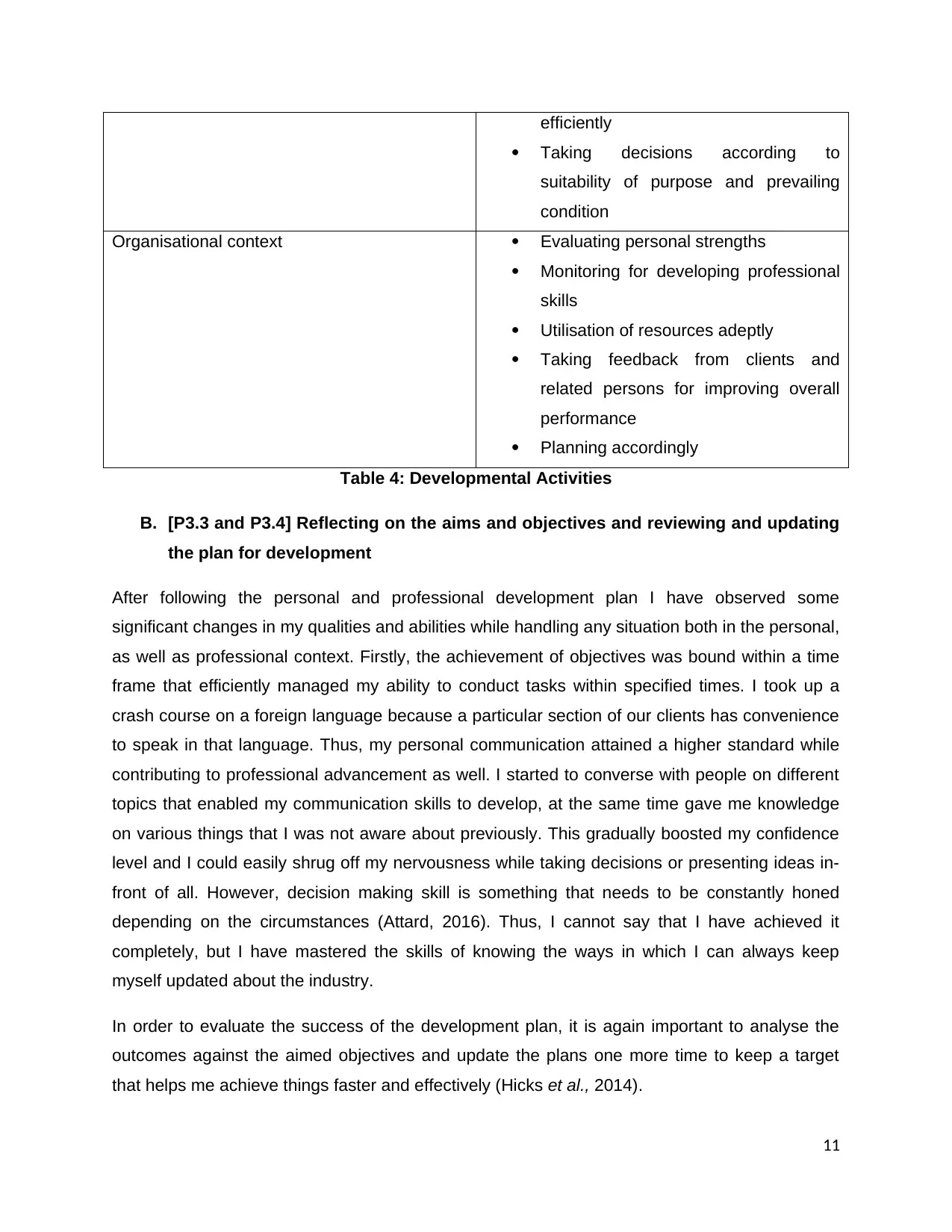
efficiently
Taking decisions according to
suitability of purpose and prevailing
condition
Organisational context Evaluating personal strengths
Monitoring for developing professional
skills
Utilisation of resources adeptly
Taking feedback from clients and
related persons for improving overall
performance
Planning accordingly
Table 4: Developmental Activities
B. [P3.3 and P3.4] Reflecting on the aims and objectives and reviewing and updating
the plan for development
After following the personal and professional development plan I have observed some
significant changes in my qualities and abilities while handling any situation both in the personal,
as well as professional context. Firstly, the achievement of objectives was bound within a time
frame that efficiently managed my ability to conduct tasks within specified times. I took up a
crash course on a foreign language because a particular section of our clients has convenience
to speak in that language. Thus, my personal communication attained a higher standard while
contributing to professional advancement as well. I started to converse with people on different
topics that enabled my communication skills to develop, at the same time gave me knowledge
on various things that I was not aware about previously. This gradually boosted my confidence
level and I could easily shrug off my nervousness while taking decisions or presenting ideas in-
front of all. However, decision making skill is something that needs to be constantly honed
depending on the circumstances (Attard, 2016). Thus, I cannot say that I have achieved it
completely, but I have mastered the skills of knowing the ways in which I can always keep
myself updated about the industry.
In order to evaluate the success of the development plan, it is again important to analyse the
outcomes against the aimed objectives and update the plans one more time to keep a target
that helps me achieve things faster and effectively (Hicks et al., 2014).
11
Taking decisions according to
suitability of purpose and prevailing
condition
Organisational context Evaluating personal strengths
Monitoring for developing professional
skills
Utilisation of resources adeptly
Taking feedback from clients and
related persons for improving overall
performance
Planning accordingly
Table 4: Developmental Activities
B. [P3.3 and P3.4] Reflecting on the aims and objectives and reviewing and updating
the plan for development
After following the personal and professional development plan I have observed some
significant changes in my qualities and abilities while handling any situation both in the personal,
as well as professional context. Firstly, the achievement of objectives was bound within a time
frame that efficiently managed my ability to conduct tasks within specified times. I took up a
crash course on a foreign language because a particular section of our clients has convenience
to speak in that language. Thus, my personal communication attained a higher standard while
contributing to professional advancement as well. I started to converse with people on different
topics that enabled my communication skills to develop, at the same time gave me knowledge
on various things that I was not aware about previously. This gradually boosted my confidence
level and I could easily shrug off my nervousness while taking decisions or presenting ideas in-
front of all. However, decision making skill is something that needs to be constantly honed
depending on the circumstances (Attard, 2016). Thus, I cannot say that I have achieved it
completely, but I have mastered the skills of knowing the ways in which I can always keep
myself updated about the industry.
In order to evaluate the success of the development plan, it is again important to analyse the
outcomes against the aimed objectives and update the plans one more time to keep a target
that helps me achieve things faster and effectively (Hicks et al., 2014).
11
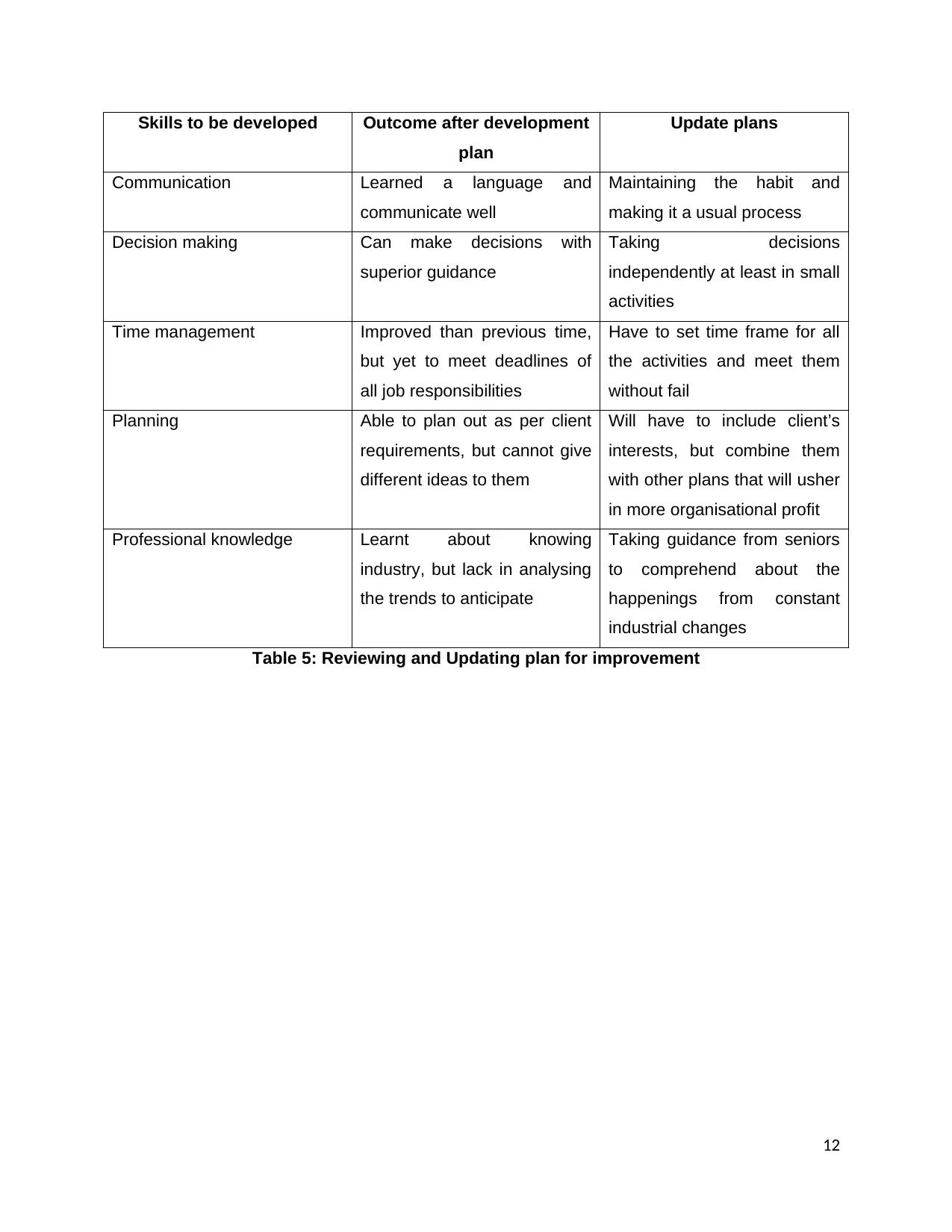
Skills to be developed Outcome after development
plan
Update plans
Communication Learned a language and
communicate well
Maintaining the habit and
making it a usual process
Decision making Can make decisions with
superior guidance
Taking decisions
independently at least in small
activities
Time management Improved than previous time,
but yet to meet deadlines of
all job responsibilities
Have to set time frame for all
the activities and meet them
without fail
Planning Able to plan out as per client
requirements, but cannot give
different ideas to them
Will have to include client’s
interests, but combine them
with other plans that will usher
in more organisational profit
Professional knowledge Learnt about knowing
industry, but lack in analysing
the trends to anticipate
Taking guidance from seniors
to comprehend about the
happenings from constant
industrial changes
Table 5: Reviewing and Updating plan for improvement
12
plan
Update plans
Communication Learned a language and
communicate well
Maintaining the habit and
making it a usual process
Decision making Can make decisions with
superior guidance
Taking decisions
independently at least in small
activities
Time management Improved than previous time,
but yet to meet deadlines of
all job responsibilities
Have to set time frame for all
the activities and meet them
without fail
Planning Able to plan out as per client
requirements, but cannot give
different ideas to them
Will have to include client’s
interests, but combine them
with other plans that will usher
in more organisational profit
Professional knowledge Learnt about knowing
industry, but lack in analysing
the trends to anticipate
Taking guidance from seniors
to comprehend about the
happenings from constant
industrial changes
Table 5: Reviewing and Updating plan for improvement
12
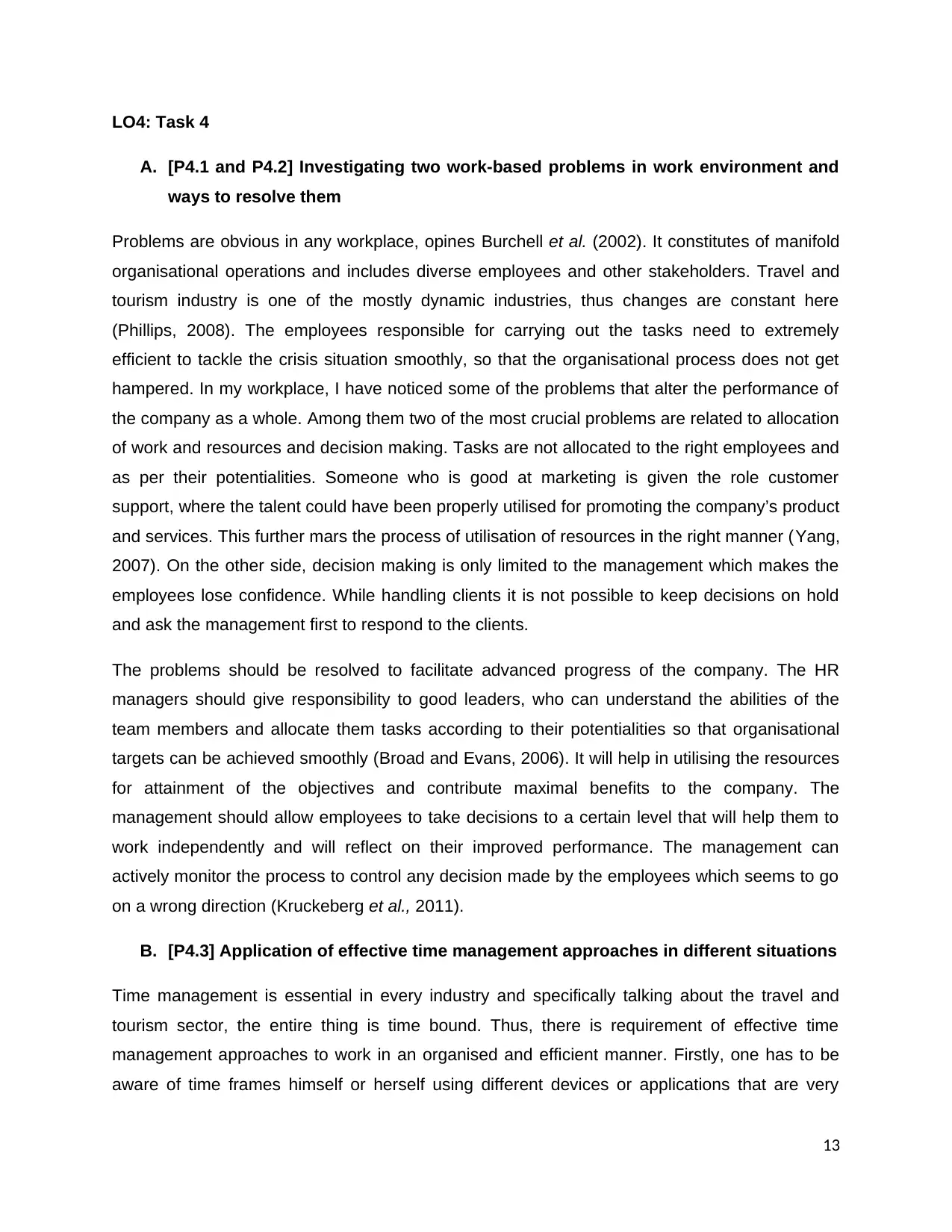
LO4: Task 4
A. [P4.1 and P4.2] Investigating two work-based problems in work environment and
ways to resolve them
Problems are obvious in any workplace, opines Burchell et al. (2002). It constitutes of manifold
organisational operations and includes diverse employees and other stakeholders. Travel and
tourism industry is one of the mostly dynamic industries, thus changes are constant here
(Phillips, 2008). The employees responsible for carrying out the tasks need to extremely
efficient to tackle the crisis situation smoothly, so that the organisational process does not get
hampered. In my workplace, I have noticed some of the problems that alter the performance of
the company as a whole. Among them two of the most crucial problems are related to allocation
of work and resources and decision making. Tasks are not allocated to the right employees and
as per their potentialities. Someone who is good at marketing is given the role customer
support, where the talent could have been properly utilised for promoting the company’s product
and services. This further mars the process of utilisation of resources in the right manner (Yang,
2007). On the other side, decision making is only limited to the management which makes the
employees lose confidence. While handling clients it is not possible to keep decisions on hold
and ask the management first to respond to the clients.
The problems should be resolved to facilitate advanced progress of the company. The HR
managers should give responsibility to good leaders, who can understand the abilities of the
team members and allocate them tasks according to their potentialities so that organisational
targets can be achieved smoothly (Broad and Evans, 2006). It will help in utilising the resources
for attainment of the objectives and contribute maximal benefits to the company. The
management should allow employees to take decisions to a certain level that will help them to
work independently and will reflect on their improved performance. The management can
actively monitor the process to control any decision made by the employees which seems to go
on a wrong direction (Kruckeberg et al., 2011).
B. [P4.3] Application of effective time management approaches in different situations
Time management is essential in every industry and specifically talking about the travel and
tourism sector, the entire thing is time bound. Thus, there is requirement of effective time
management approaches to work in an organised and efficient manner. Firstly, one has to be
aware of time frames himself or herself using different devices or applications that are very
13
A. [P4.1 and P4.2] Investigating two work-based problems in work environment and
ways to resolve them
Problems are obvious in any workplace, opines Burchell et al. (2002). It constitutes of manifold
organisational operations and includes diverse employees and other stakeholders. Travel and
tourism industry is one of the mostly dynamic industries, thus changes are constant here
(Phillips, 2008). The employees responsible for carrying out the tasks need to extremely
efficient to tackle the crisis situation smoothly, so that the organisational process does not get
hampered. In my workplace, I have noticed some of the problems that alter the performance of
the company as a whole. Among them two of the most crucial problems are related to allocation
of work and resources and decision making. Tasks are not allocated to the right employees and
as per their potentialities. Someone who is good at marketing is given the role customer
support, where the talent could have been properly utilised for promoting the company’s product
and services. This further mars the process of utilisation of resources in the right manner (Yang,
2007). On the other side, decision making is only limited to the management which makes the
employees lose confidence. While handling clients it is not possible to keep decisions on hold
and ask the management first to respond to the clients.
The problems should be resolved to facilitate advanced progress of the company. The HR
managers should give responsibility to good leaders, who can understand the abilities of the
team members and allocate them tasks according to their potentialities so that organisational
targets can be achieved smoothly (Broad and Evans, 2006). It will help in utilising the resources
for attainment of the objectives and contribute maximal benefits to the company. The
management should allow employees to take decisions to a certain level that will help them to
work independently and will reflect on their improved performance. The management can
actively monitor the process to control any decision made by the employees which seems to go
on a wrong direction (Kruckeberg et al., 2011).
B. [P4.3] Application of effective time management approaches in different situations
Time management is essential in every industry and specifically talking about the travel and
tourism sector, the entire thing is time bound. Thus, there is requirement of effective time
management approaches to work in an organised and efficient manner. Firstly, one has to be
aware of time frames himself or herself using different devices or applications that are very
13
Paraphrase This Document
Need a fresh take? Get an instant paraphrase of this document with our AI Paraphraser
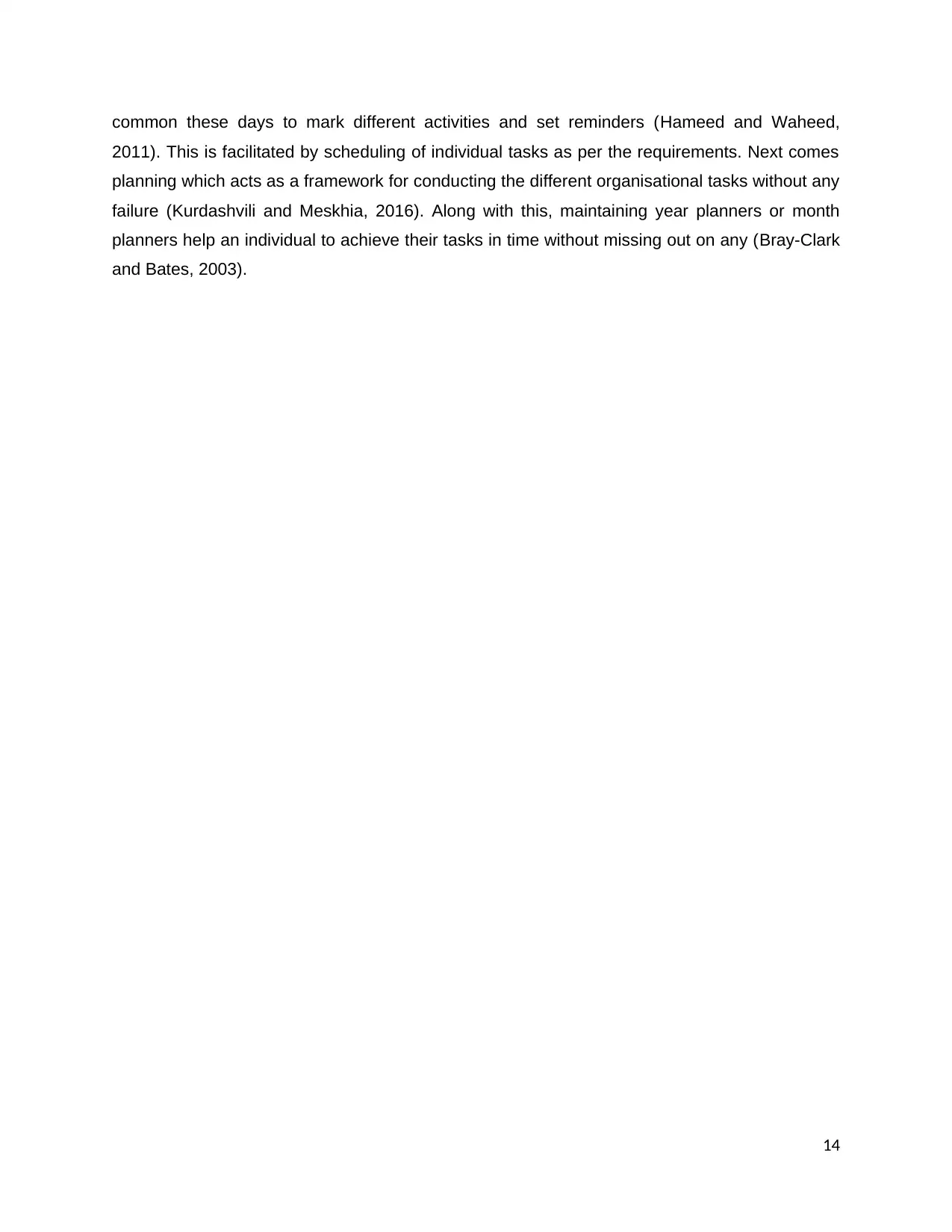
common these days to mark different activities and set reminders (Hameed and Waheed,
2011). This is facilitated by scheduling of individual tasks as per the requirements. Next comes
planning which acts as a framework for conducting the different organisational tasks without any
failure (Kurdashvili and Meskhia, 2016). Along with this, maintaining year planners or month
planners help an individual to achieve their tasks in time without missing out on any (Bray-Clark
and Bates, 2003).
14
2011). This is facilitated by scheduling of individual tasks as per the requirements. Next comes
planning which acts as a framework for conducting the different organisational tasks without any
failure (Kurdashvili and Meskhia, 2016). Along with this, maintaining year planners or month
planners help an individual to achieve their tasks in time without missing out on any (Bray-Clark
and Bates, 2003).
14
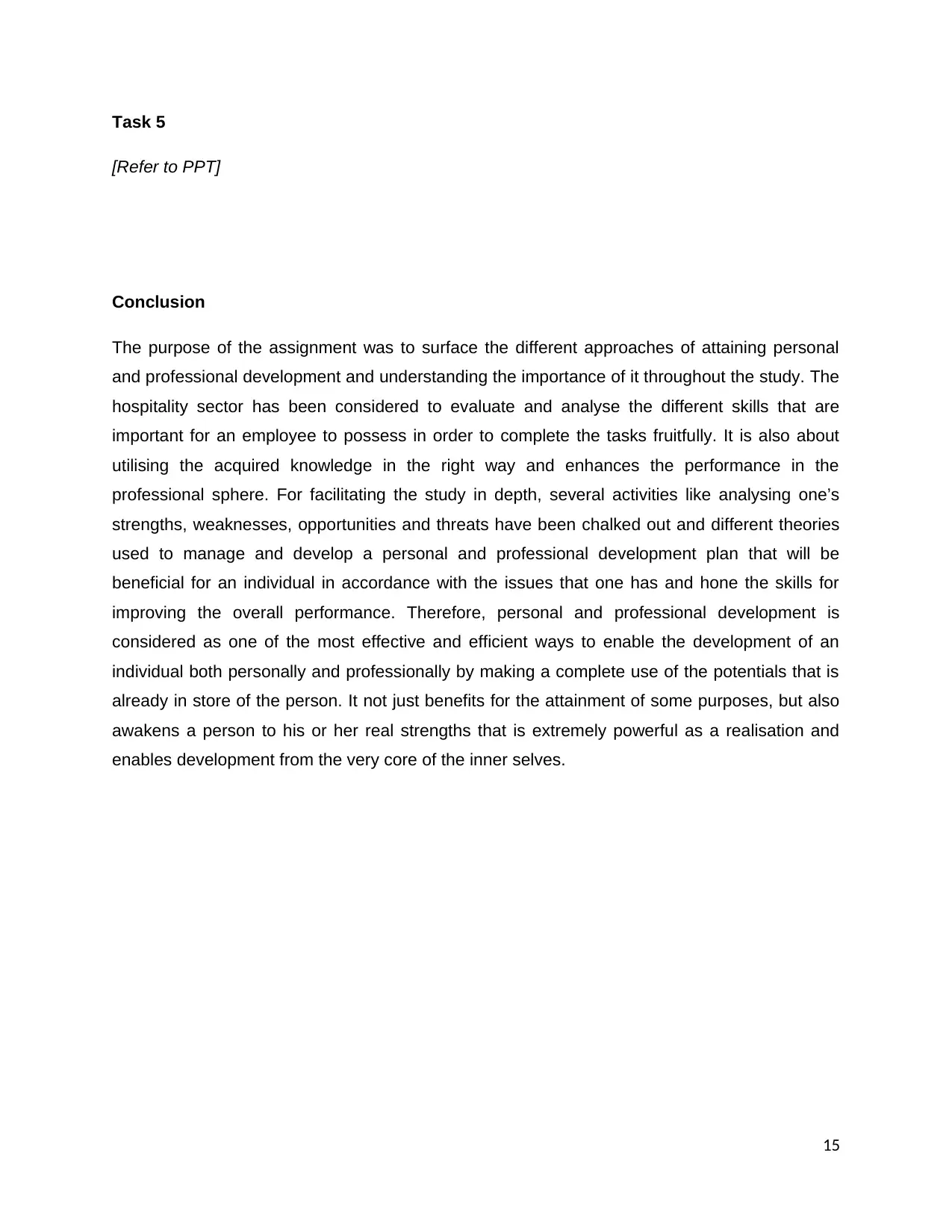
Task 5
[Refer to PPT]
Conclusion
The purpose of the assignment was to surface the different approaches of attaining personal
and professional development and understanding the importance of it throughout the study. The
hospitality sector has been considered to evaluate and analyse the different skills that are
important for an employee to possess in order to complete the tasks fruitfully. It is also about
utilising the acquired knowledge in the right way and enhances the performance in the
professional sphere. For facilitating the study in depth, several activities like analysing one’s
strengths, weaknesses, opportunities and threats have been chalked out and different theories
used to manage and develop a personal and professional development plan that will be
beneficial for an individual in accordance with the issues that one has and hone the skills for
improving the overall performance. Therefore, personal and professional development is
considered as one of the most effective and efficient ways to enable the development of an
individual both personally and professionally by making a complete use of the potentials that is
already in store of the person. It not just benefits for the attainment of some purposes, but also
awakens a person to his or her real strengths that is extremely powerful as a realisation and
enables development from the very core of the inner selves.
15
[Refer to PPT]
Conclusion
The purpose of the assignment was to surface the different approaches of attaining personal
and professional development and understanding the importance of it throughout the study. The
hospitality sector has been considered to evaluate and analyse the different skills that are
important for an employee to possess in order to complete the tasks fruitfully. It is also about
utilising the acquired knowledge in the right way and enhances the performance in the
professional sphere. For facilitating the study in depth, several activities like analysing one’s
strengths, weaknesses, opportunities and threats have been chalked out and different theories
used to manage and develop a personal and professional development plan that will be
beneficial for an individual in accordance with the issues that one has and hone the skills for
improving the overall performance. Therefore, personal and professional development is
considered as one of the most effective and efficient ways to enable the development of an
individual both personally and professionally by making a complete use of the potentials that is
already in store of the person. It not just benefits for the attainment of some purposes, but also
awakens a person to his or her real strengths that is extremely powerful as a realisation and
enables development from the very core of the inner selves.
15
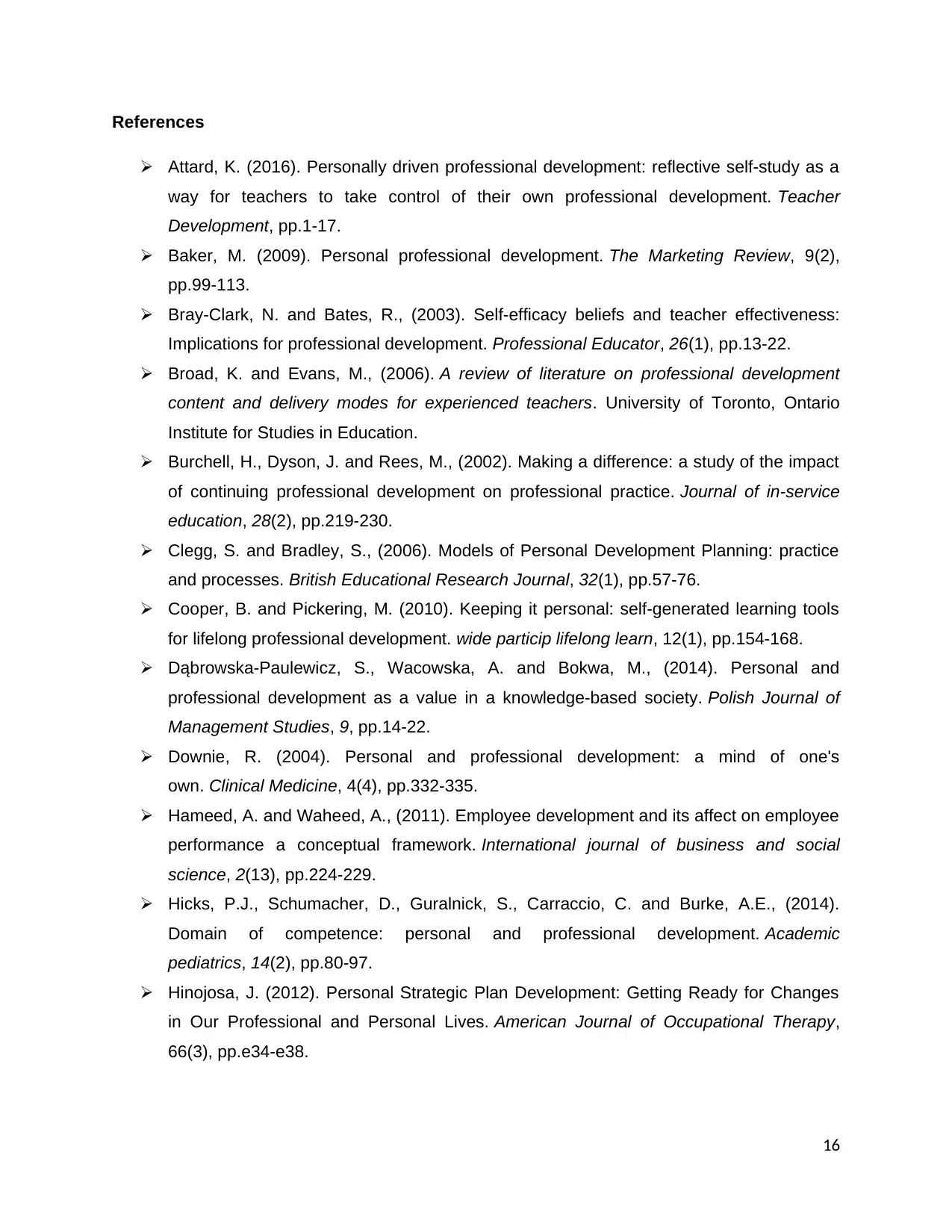
References
Attard, K. (2016). Personally driven professional development: reflective self-study as a
way for teachers to take control of their own professional development. Teacher
Development, pp.1-17.
Baker, M. (2009). Personal professional development. The Marketing Review, 9(2),
pp.99-113.
Bray-Clark, N. and Bates, R., (2003). Self-efficacy beliefs and teacher effectiveness:
Implications for professional development. Professional Educator, 26(1), pp.13-22.
Broad, K. and Evans, M., (2006). A review of literature on professional development
content and delivery modes for experienced teachers. University of Toronto, Ontario
Institute for Studies in Education.
Burchell, H., Dyson, J. and Rees, M., (2002). Making a difference: a study of the impact
of continuing professional development on professional practice. Journal of in-service
education, 28(2), pp.219-230.
Clegg, S. and Bradley, S., (2006). Models of Personal Development Planning: practice
and processes. British Educational Research Journal, 32(1), pp.57-76.
Cooper, B. and Pickering, M. (2010). Keeping it personal: self-generated learning tools
for lifelong professional development. wide particip lifelong learn, 12(1), pp.154-168.
Dąbrowska-Paulewicz, S., Wacowska, A. and Bokwa, M., (2014). Personal and
professional development as a value in a knowledge-based society. Polish Journal of
Management Studies, 9, pp.14-22.
Downie, R. (2004). Personal and professional development: a mind of one's
own. Clinical Medicine, 4(4), pp.332-335.
Hameed, A. and Waheed, A., (2011). Employee development and its affect on employee
performance a conceptual framework. International journal of business and social
science, 2(13), pp.224-229.
Hicks, P.J., Schumacher, D., Guralnick, S., Carraccio, C. and Burke, A.E., (2014).
Domain of competence: personal and professional development. Academic
pediatrics, 14(2), pp.80-97.
Hinojosa, J. (2012). Personal Strategic Plan Development: Getting Ready for Changes
in Our Professional and Personal Lives. American Journal of Occupational Therapy,
66(3), pp.e34-e38.
16
Attard, K. (2016). Personally driven professional development: reflective self-study as a
way for teachers to take control of their own professional development. Teacher
Development, pp.1-17.
Baker, M. (2009). Personal professional development. The Marketing Review, 9(2),
pp.99-113.
Bray-Clark, N. and Bates, R., (2003). Self-efficacy beliefs and teacher effectiveness:
Implications for professional development. Professional Educator, 26(1), pp.13-22.
Broad, K. and Evans, M., (2006). A review of literature on professional development
content and delivery modes for experienced teachers. University of Toronto, Ontario
Institute for Studies in Education.
Burchell, H., Dyson, J. and Rees, M., (2002). Making a difference: a study of the impact
of continuing professional development on professional practice. Journal of in-service
education, 28(2), pp.219-230.
Clegg, S. and Bradley, S., (2006). Models of Personal Development Planning: practice
and processes. British Educational Research Journal, 32(1), pp.57-76.
Cooper, B. and Pickering, M. (2010). Keeping it personal: self-generated learning tools
for lifelong professional development. wide particip lifelong learn, 12(1), pp.154-168.
Dąbrowska-Paulewicz, S., Wacowska, A. and Bokwa, M., (2014). Personal and
professional development as a value in a knowledge-based society. Polish Journal of
Management Studies, 9, pp.14-22.
Downie, R. (2004). Personal and professional development: a mind of one's
own. Clinical Medicine, 4(4), pp.332-335.
Hameed, A. and Waheed, A., (2011). Employee development and its affect on employee
performance a conceptual framework. International journal of business and social
science, 2(13), pp.224-229.
Hicks, P.J., Schumacher, D., Guralnick, S., Carraccio, C. and Burke, A.E., (2014).
Domain of competence: personal and professional development. Academic
pediatrics, 14(2), pp.80-97.
Hinojosa, J. (2012). Personal Strategic Plan Development: Getting Ready for Changes
in Our Professional and Personal Lives. American Journal of Occupational Therapy,
66(3), pp.e34-e38.
16
Secure Best Marks with AI Grader
Need help grading? Try our AI Grader for instant feedback on your assignments.
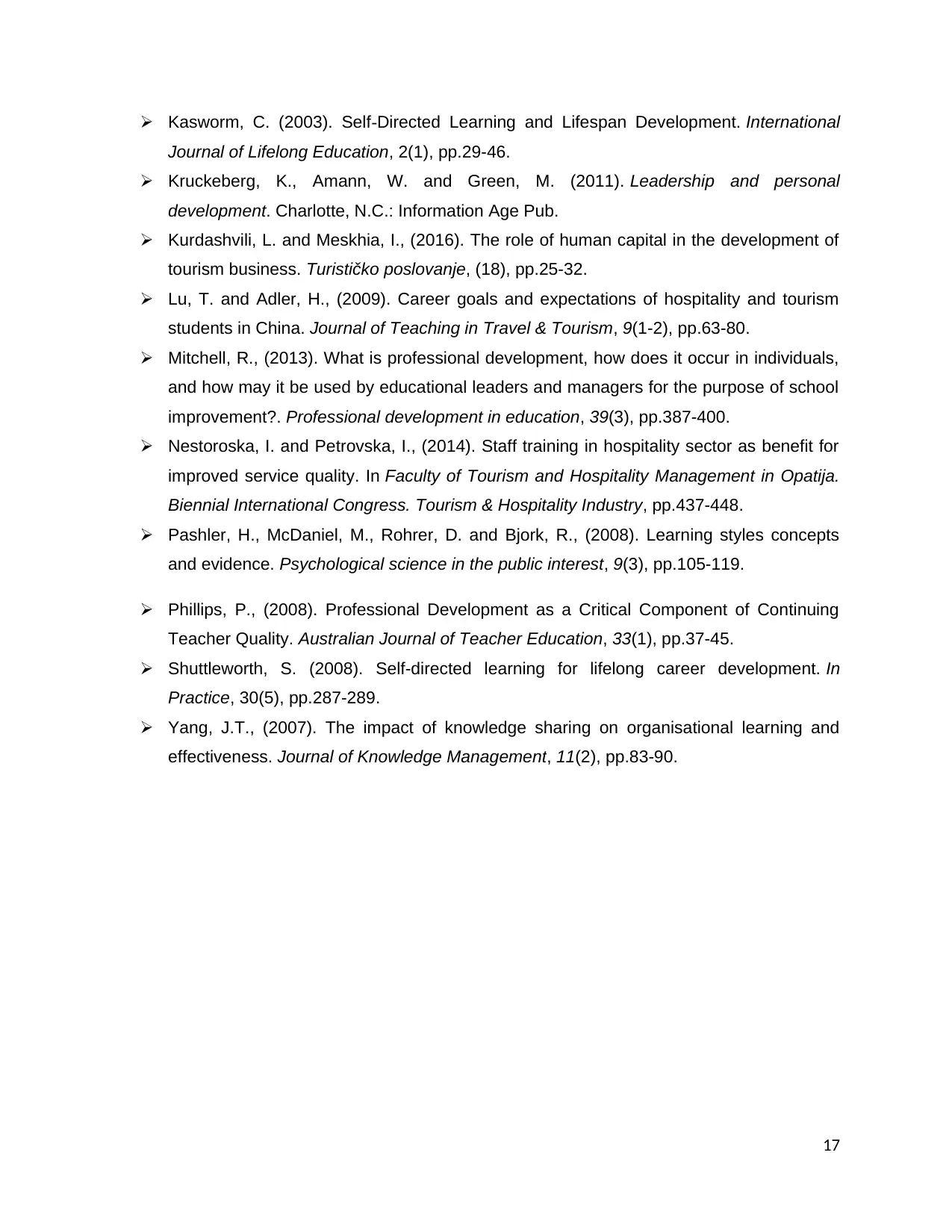
Kasworm, C. (2003). Self‐Directed Learning and Lifespan Development. International
Journal of Lifelong Education, 2(1), pp.29-46.
Kruckeberg, K., Amann, W. and Green, M. (2011). Leadership and personal
development. Charlotte, N.C.: Information Age Pub.
Kurdashvili, L. and Meskhia, I., (2016). The role of human capital in the development of
tourism business. Turističko poslovanje, (18), pp.25-32.
Lu, T. and Adler, H., (2009). Career goals and expectations of hospitality and tourism
students in China. Journal of Teaching in Travel & Tourism, 9(1-2), pp.63-80.
Mitchell, R., (2013). What is professional development, how does it occur in individuals,
and how may it be used by educational leaders and managers for the purpose of school
improvement?. Professional development in education, 39(3), pp.387-400.
Nestoroska, I. and Petrovska, I., (2014). Staff training in hospitality sector as benefit for
improved service quality. In Faculty of Tourism and Hospitality Management in Opatija.
Biennial International Congress. Tourism & Hospitality Industry, pp.437-448.
Pashler, H., McDaniel, M., Rohrer, D. and Bjork, R., (2008). Learning styles concepts
and evidence. Psychological science in the public interest, 9(3), pp.105-119.
Phillips, P., (2008). Professional Development as a Critical Component of Continuing
Teacher Quality. Australian Journal of Teacher Education, 33(1), pp.37-45.
Shuttleworth, S. (2008). Self-directed learning for lifelong career development. In
Practice, 30(5), pp.287-289.
Yang, J.T., (2007). The impact of knowledge sharing on organisational learning and
effectiveness. Journal of Knowledge Management, 11(2), pp.83-90.
17
Journal of Lifelong Education, 2(1), pp.29-46.
Kruckeberg, K., Amann, W. and Green, M. (2011). Leadership and personal
development. Charlotte, N.C.: Information Age Pub.
Kurdashvili, L. and Meskhia, I., (2016). The role of human capital in the development of
tourism business. Turističko poslovanje, (18), pp.25-32.
Lu, T. and Adler, H., (2009). Career goals and expectations of hospitality and tourism
students in China. Journal of Teaching in Travel & Tourism, 9(1-2), pp.63-80.
Mitchell, R., (2013). What is professional development, how does it occur in individuals,
and how may it be used by educational leaders and managers for the purpose of school
improvement?. Professional development in education, 39(3), pp.387-400.
Nestoroska, I. and Petrovska, I., (2014). Staff training in hospitality sector as benefit for
improved service quality. In Faculty of Tourism and Hospitality Management in Opatija.
Biennial International Congress. Tourism & Hospitality Industry, pp.437-448.
Pashler, H., McDaniel, M., Rohrer, D. and Bjork, R., (2008). Learning styles concepts
and evidence. Psychological science in the public interest, 9(3), pp.105-119.
Phillips, P., (2008). Professional Development as a Critical Component of Continuing
Teacher Quality. Australian Journal of Teacher Education, 33(1), pp.37-45.
Shuttleworth, S. (2008). Self-directed learning for lifelong career development. In
Practice, 30(5), pp.287-289.
Yang, J.T., (2007). The impact of knowledge sharing on organisational learning and
effectiveness. Journal of Knowledge Management, 11(2), pp.83-90.
17
1 out of 17
Related Documents
Your All-in-One AI-Powered Toolkit for Academic Success.
+13062052269
info@desklib.com
Available 24*7 on WhatsApp / Email
![[object Object]](/_next/static/media/star-bottom.7253800d.svg)
Unlock your academic potential
© 2024 | Zucol Services PVT LTD | All rights reserved.





